A review on oxidative stress in organophosphate-induced neurotoxicity
IF 2.8
3区 生物学
Q2 BIOCHEMISTRY & MOLECULAR BIOLOGY
International Journal of Biochemistry & Cell Biology
Pub Date : 2025-01-22
DOI:10.1016/j.biocel.2025.106735
引用次数: 0
Abstract
Acetylcholinesterase inhibition, the principal mechanism of acute organophosphorus compound toxicity, cannot explain neuropsychiatric symptoms occurring after exposure to low organophosphate concentrations causing no cholinergic symptoms. Organophosphate-triggered oxidative stress has increasingly come into focus, occurring when the action of reactive oxygen species, generated from free radicals, is not compensated by antioxidant free radical scavengers. Being nucleophilic, organophosphates can easily accept an electron, thereby generating free radicals. Organophosphates inhibit the antioxidant paraoxonase, and reactive oxygen species are produced during organophosphate metabolism. Organophosphates disrupt the function of mitochondria, the principal source of free radicals. Organophosphates also induce neuroinflammation, which generates reactive oxygen species, and reactive oxygen species in turn stimulate neuroinflammation. Markers of reactive oxygen species are elevated in vitro and in vivo after exposure to organophosphates and in individuals professionally exposed to organophosphates. This most probably contributes to the pathogenesis of the intermediate syndrome, chronic organophosphate-induced neuropsychiatric disorders and neurodegeneration occurring in patients after organophosphate exposure. Evidence for beneficial effects of antioxidants in organophosphate poisoning is discussed.
有机磷酸酯诱导的氧化应激神经毒性研究进展。
乙酰胆碱酯酶抑制是急性有机磷化合物毒性的主要机制,但不能解释暴露于低浓度有机磷后出现的神经精神症状,而不会引起胆碱能症状。有机磷酸酯引发的氧化应激越来越成为人们关注的焦点,当自由基产生的活性氧的作用没有被抗氧化自由基清除剂补偿时,就会发生氧化应激。由于是亲核的,有机磷酸盐很容易接受电子,从而产生自由基。有机磷酸盐抑制抗氧化对氧酶,并在有机磷酸盐代谢过程中产生活性氧。有机磷破坏线粒体的功能,而线粒体是自由基的主要来源。有机磷酸盐还会引起神经炎症,从而产生活性氧,而活性氧又会刺激神经炎症。暴露于有机磷酸盐后,体内和体外的活性氧标记物以及专业接触有机磷酸盐的个体都会升高。这很可能是有机磷暴露后患者出现中间综合征和慢性有机磷诱导神经精神疾病的发病机制。讨论了抗氧化剂对有机磷中毒有益作用的证据。
本文章由计算机程序翻译,如有差异,请以英文原文为准。
求助全文
约1分钟内获得全文
求助全文
来源期刊
CiteScore
8.10
自引率
0.00%
发文量
124
审稿时长
19 days
期刊介绍:
IJBCB publishes original research articles, invited reviews and in-focus articles in all areas of cell and molecular biology and biomedical research.
Topics of interest include, but are not limited to:
-Mechanistic studies of cells, cell organelles, sub-cellular molecular pathways and metabolism
-Novel insights into disease pathogenesis
-Nanotechnology with implication to biological and medical processes
-Genomics and bioinformatics

 求助内容:
求助内容: 应助结果提醒方式:
应助结果提醒方式:


